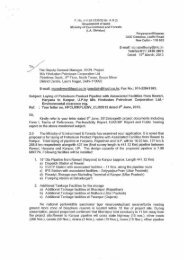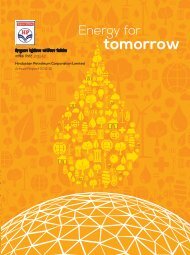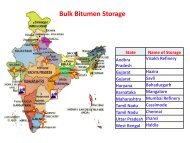Bringing Smiles - Hindustan Petroleum Corporation Limited
Bringing Smiles - Hindustan Petroleum Corporation Limited
Bringing Smiles - Hindustan Petroleum Corporation Limited
Create successful ePaper yourself
Turn your PDF publications into a flip-book with our unique Google optimized e-Paper software.
<strong>Bringing</strong> <strong>Smiles</strong><br />
HPCL<br />
Corporate Social Responsibility
Chairman’s message<br />
Arun Balakrishnan<br />
Chairman & Managing Director<br />
Any business organisation of today has to include the triple bottom line of People,<br />
Planet and Profit. HPCL pioneered the creation of “creating socially responsible”<br />
business processes to produce an overall positive impact on society through its activities<br />
since 1985. Interestingly it was around the same time when R. Edward Freeman penned<br />
his book Strategic Management: A Stakeholder Approach, and in which he coined the<br />
word “Corporate Social Responsibility”.<br />
I am associated with the HPCL’s activities for a quarter of a century now. We have<br />
worked closely with district administration who knows the developmental needs of the<br />
area and the people. We blend the strengths of our resources and the district<br />
administration’s understanding of the problem, to find solutions. We have been able to<br />
contribute towards society in terms of construction of school buildings, taking care of<br />
basic amenities and giving specialised training to the needy to enable them earn a living.<br />
HPCL puts in plenty of thought while formulating CSR activities. Our primary focus<br />
in CSR is the girl child, juveniles, school dropouts, youth and truck drivers. The projects<br />
have been chalked out with a clear understanding of the problems of these sections of<br />
the society and with the aim of finding solutions to these problems.<br />
I believe that newer projects will have outcomes, spread over decades. The girl<br />
child, whom we are sponsoring, will grow up to be a responsible mother and citizen.<br />
We strongly believe in the benefits of women empowerment. Computer familiarisation<br />
in schools opens up avenues for students from ill-equipped institutions. We will<br />
endeavor to make school drop outs and juveniles, good citizens.<br />
In conclusion, I am reminded of what Wilfred Grenfell said “The service we render<br />
others is the rent we pay for our room on earth”. That’s the way we in HPCL think and<br />
that’s the way we will grow.
Director HR<br />
Corporate social responsibility (CSR) means a commitment by a company to manage<br />
its roles in a society in a responsible and sustainable manner. Especially since the<br />
1980's, CSR has become an increasingly important part of the business environment.<br />
Today, there is a growing perception among enterprises that sustainable business<br />
success and shareholder value cannot be achieved solely through maximising shortterm<br />
profits, but instead through market-oriented yet responsible behaviour<br />
HPCL is one of the first organisations in the country, especially in the oil sector, to<br />
take up CSR activities, dating back to 1985.<br />
The HPCL CSR activities are concentrated more in the area where the organisation<br />
operates. This is in tune with its philosophy to work with all stakeholders and<br />
communities, where the organisation has its operations.<br />
The CSR activities range from working among street and slum children, school<br />
children, girl child and the youth, to health care and drinking water augmentation. These<br />
also extend to relief work during natural calamities at the same time contributing to<br />
education, vocational education, health and hygiene.<br />
Through Hamara Pump, fuel is provided to farmers in the rural areas without<br />
travelling distances and they also find it as a single point outlet for a variety of agriinputs<br />
and farm financing.<br />
The HP Rasoi Ghar is a boon to women in the rural areas. Women, who had to exert<br />
themselves while collecting bio-fuels and had also to inhale obnoxious fumes while<br />
cooking, are now saved the trouble, by the HP Rasoi Ghar, where they are provided with<br />
LPG connections, for them to cook their food at the community kitchen at a nominal<br />
cost. Over 22,000 families benefit every day from the 15,000 HP Rasoi Ghar spread<br />
across the country.<br />
HPCL remains committed to play a key role in society towards a sustainable<br />
development.<br />
Dr. V. Vizia Saradhi
Executive Director HR<br />
The key success factor of CSR of any organisation is not only the funds earmarked,<br />
but the commitment and enthusiasm of the employees of that organisation. Employees<br />
play a major role in the implementation of CSR. This helps the organisation achieve<br />
its objective of making a difference in the lives of the people for whom the activities<br />
are intended.<br />
HPCL is committed to create a positive impact on the society and contribute to socioeconomic<br />
development including measures for improving the quality of life of<br />
underprivileged classes of the society. Every year, substantial financial provisions are<br />
made for the execution of CSR activities.<br />
The organisation meets its societal obligations/commitments by developments in<br />
and around refineries, installations and important markets/business areas; commitments<br />
under the component plan on the basis of the government mandate; focused attention<br />
on marginalised sections of the society and extending help during the times of natural<br />
calamities/needs.<br />
Wherever necessary, HPCL takes the help of expert organisations and individuals for<br />
better implementation of its CSR activities. These projects are voluntarily adopted by<br />
the Senior Managers of CSR as the project owners. There are regular reviews of the<br />
activities to ensure desired outcomes.<br />
HR plays an ownership role for the CSR processes in the organisation, in line with<br />
the corporate objectives.<br />
Dinesh K. Deshpande
CSR Purpose statement of HPCL<br />
Serving the community is the purpose of our business;<br />
Ensuring sustainable business process-financially,<br />
environmentally and socially-is our effort;<br />
Using core competence, expertise and technology of our<br />
business to reach the common people, especially the<br />
underprivileged, is our aim,<br />
Developing capacity in the community is our strategy;<br />
Enhancing human excellence and improving quality of<br />
life is our endeavour.<br />
HPCL’s CSR is not restricted merely to serving<br />
the society, but it starts with responsible and<br />
efficient management of all its operations,<br />
products and services that create positive impact<br />
on the society.<br />
Since 1985, innumerable activities have been<br />
undertaken by HPCL as a part of its CSR.
Unnati<br />
The project is aimed at<br />
providing time bound<br />
computer training<br />
programmes and personal<br />
computers to students in<br />
semi-urban and rural<br />
schools. The training is<br />
given through National<br />
Institute of Information<br />
Technology, (NIIT) and<br />
the students are trained in<br />
computer basics, including<br />
MS Office.<br />
The project is carried out<br />
in Maharashtra, Andhra<br />
Pradesh, Uttar Pradesh and<br />
Rajasthan and 4,000<br />
students are given this<br />
training. The training is<br />
imparted free of charge to<br />
the students and the cost of<br />
the training is borne by<br />
HPCL. The duration of the<br />
training is four to six<br />
months.<br />
The programme has<br />
helped students from the<br />
economically backward<br />
class to get computer<br />
training and their teachers<br />
are happy over the results.
Swavalamban<br />
One of the biggest problems<br />
faced by the country and its youth<br />
is unemployment.<br />
Also most of the youth in rural<br />
areas lack the requisite skills for<br />
the jobs that are available. To add<br />
to this is the shift from agriculture.<br />
Agriculture and agriculture<br />
based activities used to absorb a<br />
sizable section of the population<br />
in terms of employment. The<br />
modernisation of agricultural<br />
methods has reduced the<br />
employment potential of<br />
agriculture.<br />
Mahatma Gandhi emphasised<br />
the development of the rural areas<br />
and maintained that India lives in<br />
its villages.<br />
For the rural youth to be<br />
employed and preferably within<br />
their area, there is a need for them<br />
to be trained in different skills.<br />
There is also a need to make<br />
them capable of being selfemployed<br />
that give them the<br />
means of earning, while at the<br />
same time, it helps create job<br />
opportunities for others.
Orphans are given preference<br />
during selection and school dropouts<br />
are also considered, so that they can<br />
start earning at the earliest.<br />
There are opportunities to be<br />
employed as drivers, nurses and<br />
masons, apart from those in<br />
industrial workshops.<br />
Agro-based sectors also have a<br />
huge potential for employment<br />
generation, but the youth ought to<br />
be trained in those fields.<br />
Having understood the needs of<br />
the youth, HPCL took up the<br />
challenge of training youth in<br />
different skills to make them<br />
employable or for them to start their<br />
own enterprise.<br />
Such training is being given to<br />
1,800 youth in locations like<br />
Hyderabad,<br />
Chandigarh,<br />
Visakhapatnam and Bihar.<br />
The project is implemented in<br />
association with the Confederation<br />
of India Industry (CII) and the<br />
training does not earn the<br />
beneficiaries any diploma or<br />
certificate, but makes the person<br />
capable of using the skills, acquired at<br />
such training, to earn a living. They<br />
are also trained in customer<br />
relationship. The 1,800 youth trained<br />
have already started earning.<br />
Unemployed youth from<br />
families, whose income is not over<br />
Rs 10,000 per month, are given<br />
vocational training in trades like<br />
plumbing, automobile repairing,<br />
welding, fabrication and electrical<br />
installation.
Muskan<br />
Street children are most vulnerable and need to be protected<br />
from falling into bad company or from getting involved in antisocial<br />
or criminal activities. They also need a shelter, a caring hand<br />
and proper training to make a good career. The Muskan project,<br />
executed in association with Prayas, does just that.<br />
Two hundred street children have been provided shelter at<br />
Tugalkabad and Jahangipuri from Delhi state. They are provided<br />
basic needs like food, clothes, shelter, health care, education and<br />
vocational training.
The aim of Navjyot is to<br />
improve the health index of<br />
children by providing them<br />
health care, which would in<br />
turn ensure that they do not<br />
drop out of school for health<br />
reasons.<br />
Navjyot<br />
Implemented with the help<br />
of Navjyoti Foundatiuion of<br />
New Delhi, 3,100 children<br />
are beneficiaries of the<br />
project.<br />
They are provided health care facilities, referral<br />
services through regular health check up camps,<br />
rehabilitation for slum families and training<br />
programmes, which include family planning<br />
programme.<br />
The children are taught to keep themselves<br />
clean, especially their hair, nose and eyes clean;<br />
that they drink clean water and follow a balanced<br />
diet. The children and their parents are advised on<br />
the need for a balanced diet and wherever<br />
required, a diet chart is worked out on the basis of<br />
the child’s health and given to the parents for<br />
implementation.
Suraksha<br />
The incidence of HIV-AIDS is very high<br />
in the country and among those most<br />
affected, as well as in the high-risk<br />
segment, are the truck drivers and cleaners.<br />
Looking at the gravity of the situation<br />
and given the proximity of HPCL with<br />
this segment of the society, it was decided<br />
to take up a project named Suraksha<br />
(security) to educate the truck drivers and<br />
cleaners about HIV-AIDS and ways of<br />
preventing the diseases. The staff at the<br />
HPCL outlets is identified to be the best<br />
team to educate the drivers and cleaners,<br />
given their constant interaction with this<br />
section of the society.<br />
An MOU was signed with OSERD to<br />
run project Suraksha at 500 HPCL outlets<br />
and in the first phase 128 outlets were<br />
identified in Tamil Nadu, Delhi, Haryana,<br />
Rajasthan, Bihar, Jharkhand and<br />
Maharashtra. The present project partner<br />
is TCIF.<br />
The objective is to arrest the fast spread<br />
of AIDS and ensure the safety of the<br />
members of the families of the drivers and<br />
cleaners. Emphasis is also laid on the fact<br />
that the wives and children of this<br />
segment, suffer for no fault of theirs.<br />
The programme creates a committed<br />
cadre from among the staff at the outlets,<br />
especially along the highways and<br />
through them bring about a behavioural<br />
change in the target group, through<br />
acceptance of safe practices.
Extensive interactive<br />
training was given to<br />
400 members of the<br />
petrol pump staff and<br />
12 HPCL officials. The<br />
training also involved<br />
group discussions and<br />
games.<br />
A survey was carried<br />
out, which helped in<br />
making the project<br />
successful.<br />
Condom vending<br />
machines have been<br />
installed at petrol pumps,<br />
giving the target group<br />
easy access to condoms.
Nanhi Kali<br />
All the beneficiaries of the Nanhi Kali project come from very poor families and<br />
computer training is beyond their means. Domestic work and other pressures prevent<br />
them from indulging in creative and performing arts.<br />
The project gives them a platform to display their creative talents.<br />
The girls are also taken for educational tours, which exposes them to new places and<br />
helps them learn about these places. It is a good combination of study and pleasure.<br />
There has been a marked improvement in the personalities of the 3,600 girl children<br />
beneficiaries of the Nanhi Kali project, which implemented through K C Mahindra<br />
Foundation.
The girl child is provided with<br />
school uniforms, given extra<br />
training and encouraged to<br />
participate in extra-curricular<br />
activities like singing, dramatics<br />
and the like.<br />
HPCL has always been<br />
encouraging the girl child in her<br />
academics as well as to enable<br />
her accomplish her dreams, by<br />
tapping her potential.
Global Warming<br />
Global warming is<br />
another issue bothering<br />
humankind. The fight against global<br />
warming and for the preservation of<br />
ecology cannot be successful without the<br />
participation of the people at large.<br />
The best way to educate the members of the<br />
public is to begin with children. HPCL launched<br />
a project on educating schoolschildren on global<br />
warming. This project was implemented with<br />
Centre for Social Responsibility Leadership as<br />
the operating partner and nearly 20,000<br />
school children were educated on the<br />
causes of global warming.
Dealer Training<br />
HPCL dealers need not have done<br />
MBA to be successful in their business,<br />
as HPCL has designed an effective<br />
four-week Intensive Training<br />
programme, called the Management<br />
Development Programme, meant for<br />
New Corpus Fund Retail outlet dealers.<br />
It is a combination of managerial and<br />
functional module designed to provide<br />
requisite business needs for a new<br />
dealer.<br />
Bankers, as guest lecturers, educate<br />
the dealers on the finance portfolio and<br />
for effective fund management, while<br />
HPCL senior officers and successful<br />
dealers of HPCL share their rich<br />
experiences for better business and<br />
customer handling.
Thus this Mini MBA programme,<br />
as it is fondly called, takes care of the<br />
“Individual learning to collective<br />
learning” and makes the dealer<br />
confident and self supportive to<br />
manage the business well since<br />
inception of the dealership and<br />
equips the participant with all tools<br />
and techniques, both theoretical and<br />
practical, to become a successful<br />
business partner with HPCL.<br />
During 2008-09, HPCL organised<br />
15 such programmes covering 318<br />
new dealers (around 90 per cent<br />
SC/ST dealers). During 2009-10,<br />
more than 500 new dealers are<br />
targeted for training under MDPs.
Rasoi Ghar<br />
Alarge number of people in rural<br />
India do not have access to<br />
modern fuels and have to depend<br />
on traditional fuels like twigs,<br />
animal waste and charcoal.<br />
Women and the girl<br />
children have to spend<br />
plenty of their time<br />
and energy in<br />
collecting of twigs<br />
and firewood from<br />
the forest or open<br />
land; or in make<br />
fuel cakes from<br />
animal waste.<br />
Moreover, during<br />
cooking and boiling<br />
water for bathing they are<br />
exposed to carbon monoxide and<br />
other harmful gases affecting their health.<br />
Given their poverty, these families cannot<br />
afford to buy a hotplate or spend on LPG<br />
connections. Noticing this problem, HPCL<br />
came up with an innovative idea of setting up<br />
Rasoi Ghar, community kitchen, where<br />
women are given LPG connections with<br />
hotplates, for them to use the fuel for a<br />
nominal cost of Rs 4 per hour to carry out<br />
their domestic work. HPCL also provides<br />
utensils in these kitchens and the<br />
beneficiaries have to merely bring their raw<br />
material to carry out their chores.<br />
The Wood Consumption<br />
Study carried out by the<br />
Forest Department of<br />
India revealed,<br />
“…the fire wood<br />
consumption per<br />
household of four<br />
is approximately<br />
4 kg per day.”<br />
To get that<br />
much fire wood,<br />
around 10 small trees<br />
have to be cut, which<br />
would come to 3,600 trees<br />
per annum per lady, who goes to<br />
pick up fire wood. The use of LPG provided<br />
by HPCL helps in saving the trees, apart from<br />
saving the energy and health of the women.<br />
The Rasoi Ghar has become very popular<br />
amongst the women and it has also<br />
contributed in saving trees.<br />
Today there are over 1950 Rasoi Ghar<br />
spread across the country benefiting 22,000<br />
families everyday.<br />
For this activity, HPCL won the Golden Peacock Award in 2005 for CSR<br />
and National Excellence Award for innovative techniques for improving<br />
the access of rural women to a modern fuel.
Benefits of Rasoi Ghar<br />
Reduce Deforestation and<br />
climate change<br />
No one time investment on<br />
LPG connection (deposit/<br />
stove),<br />
Payment according to<br />
usage<br />
Saves time otherwise spent<br />
on collection of firewood<br />
and on cooking<br />
Women can use the time<br />
for Value Added Activities<br />
Girls have more time for<br />
education<br />
Better health and hygiene<br />
for women
Dikshabhoomi<br />
Among the areas of work are adoption of villages, primary education,<br />
health care, drinking water facilities and provision of live stock. There is<br />
a special component plan for the Scheduled Castes and Scheduled Tribes.<br />
In 2005, CSRL were appointed as consultants and a study was carried out<br />
at the major locations to evaluate the CSR activities and the component<br />
plan. The recommendations based on the study were placed before the<br />
CFD/Board and following its adoption projects like Swavalamban,<br />
Muskan, Nanhi Kali, Navjyot, Suraksha, Unnati, Naya Netritva, Bihar<br />
Development and Leadership lectures were launched. Presently,<br />
Swalamban, Muskan, Nanhi Kali, Navjyot, Suraksha and Unnati are the<br />
active projects.<br />
Lakhs of people assemble every<br />
year at the Dikshabhoomi at Nagpur<br />
to commemorate the embracing of<br />
Buddhism by Dr Babasasheb<br />
Ambedkar and HPCL makes<br />
arrangement for free food packets<br />
and water for the visitors.<br />
A sizeable number of visitors are<br />
poor and travel long distances on<br />
the occasion and the free food<br />
packets and water are a boon to<br />
them.<br />
It is also the occasion for the<br />
organisation to organise eye camps<br />
and distribute spectacles to those in<br />
need.<br />
Each year, a large number of<br />
employees of HPCL offer voluntary<br />
services to make the programme<br />
successful.<br />
Chaityabhoomi
Jharcraft<br />
In continuation of its<br />
efforts to improve the socioeconomic<br />
conditions of the<br />
rural people, HPCL has<br />
entered into an agreement<br />
with Jharcraft, an<br />
undertaking of the<br />
Government of Jharkhand,<br />
to promote handicraft and<br />
handloom.<br />
HPCL has agreed to give<br />
space for the Jharcraft<br />
showrooms in major cities.<br />
The first such showroom<br />
was inaugurated in Delhi.<br />
These showrooms help the<br />
rural artisans to sell their<br />
handicraft items and<br />
handloom cloth to people in<br />
the urban areas. The good<br />
display of their work at<br />
prominent places helps them<br />
get a good market. On the<br />
day of the inauguration the<br />
Jharcraft showroom did a<br />
business of Rs 90,000.<br />
In the days to come the<br />
artisans will be able to<br />
augment their income and<br />
that will also encourage<br />
them to display more of the<br />
creative abilities.
For the Handicapped<br />
Under the ST/SC component<br />
plan, scholarships are given<br />
to the blind.<br />
Artificial limbs and wheel<br />
chairs and tricycles have been<br />
provided to the handicapped.
Employment Generation<br />
In Jammu, women have been provided with<br />
sewing and embroidery machines and they are<br />
being trained to work on these machines, which<br />
would in turn help them earn substantial sums of<br />
money.<br />
In Mizoram, it was<br />
observed that women artisans,<br />
who make beautiful items from<br />
bamboo and cane, found it<br />
difficult to transport the raw<br />
materials as well as the<br />
finished goods. These artisans,<br />
who work with an NGO, were<br />
presented a pick-up van for<br />
the purpose.<br />
In Jharkhand too, sewing machines were<br />
provided to girls from the state, who were rescued<br />
from various cities in the country, after it was found<br />
that they were being exploited as domestic workers.<br />
An advanced computer centre has been set up at the Government Boys Middle School,<br />
Lauria in the district of West Champaran, Bihar on January 6, 2010.<br />
To take care of the erratic power supply, the computer centre has a solar power back-up. The<br />
centre has 10 computers with latest configuration, wide LCD monitors and a laser colour printer.<br />
The computers are connected with LAN. The centre has facility for training 20 students at a time.<br />
Over 1000 students from class V to VIII of Government Boys Middle school, Govt Girls Middle<br />
school and all students of Goverment Girls Higher Secondary School, Lauria would benefit from<br />
the centre. Both the schools are located on the same campus.<br />
HPCL has engaged NIIT, a leading computer training institute, to train the students at the<br />
Lauria centre. NIIT will also train the teachers, who will eventually take over the computer training<br />
job.<br />
A similar course in a private training institue would have cost the student around Rs 3,000, but<br />
at the computer centre set up by HPCL the same training is given free to these students.<br />
The centre will help the students in the backward area to use computers and improve their job<br />
potential.<br />
Apart from the computer centre, HPCL has also provided desks and benches to the Government<br />
Girls Middle School, as in the absence of the furniture, the students had to sit on the floor in the<br />
class.
Helping Hand<br />
The CSR activities of HPCL extend up to Jammu<br />
and Kashmir. HPCL has opened a tailoring-cumembroidery<br />
centre at Gura More Smailpur in<br />
Jammu. Sewing and embroidery machines have<br />
been provided at the centre with a teacher. The<br />
free training helps the women, who come to the<br />
centre, earn a living.<br />
HPCL is always in the forefront in coming to<br />
the aid of victims of natural calamities, by<br />
distributing the requisite materials. This is done<br />
in coordination with the district authorities.<br />
Uniforms and other materials are also provide<br />
to school children at the beginning of the<br />
academic year.<br />
Coaching centres have been set<br />
up at different places, like the<br />
one in Ranchi.
From the Desk of GM CSR<br />
No organisation is an island in today’s world and HPCL understands the impact of<br />
interconnectedness of the business and society. It is with this deep understanding that<br />
HPCL is striving not only to create a social impact but also to involve deeply with<br />
social problems, thus making CSR a part of the core area of activities. We realise the<br />
benefits of adopting socially responsible behavior by integrating<br />
<br />
<br />
<br />
Building social capital in the community<br />
Harmonise ecological factors<br />
Add economic value<br />
Our activities are taken up after clearly establishing the elevating impact they will<br />
make for the target group. We follow the dual strategy of working closely with Government<br />
agencies and with NGOs. The experience proves that the methodology has<br />
been very effective to make an impact through our CSR activities.<br />
Since we strongly believe that business and society are very closely interwoven, we<br />
resolve to make HPCL a role model in Corporate Social Responsibility by integrating<br />
our role more with society and its growing needs.<br />
Sonal Desai<br />
GM - CSR<br />
+91-22-22871325<br />
sonaldesai@hpcl.co.in
Printed by Synergy Creations Designed by Image Creator March 2010

















